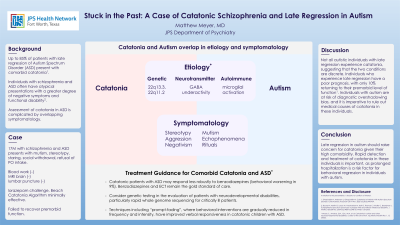Child and Adolescent Psychiatry
Session: Poster Session
(037) Stuck in the Past: A Case of Catatonic Schizophrenia and Late Regression in Autism

Trainee Involvement: Yes
- MM
Matthew Meyer, MD
Resident Psychiatrist
John Peter Smith Hospital
Fort Worth, Texas, United States
Presenting Author(s)
Up to 85% of patients with late regression of Autism Spectrum Disorder (ASD) present with comorbid catatonia (Ghaziuddin, 2021). Individuals with schizophrenia and ASD often have atypical presentations with a greater degree of negative symptoms and functional disability (Bouras, 2004). Assessment of catatonia in this population is complicated by the overlapping symptomatology of these conditions. A seventeen-year-old boy with a history of ASD and schizophrenia presented to the psychiatric emergency room with mutism, stereotypy, staring, and withdrawal. He was admitted to an inpatient adolescent psychiatric unit for treatment of catatonia where he refused food and water and required transfer to the medical floor. Medical diagnostics including MRI brain and lumbar puncture were unremarkable. The patient was treated with benzodiazepines with minimal improvement in his condition. It was noted that some symptoms of catatonia, particularly mutism, were diminished when the patient communicated with his grandmother by telephone. After exhausting the Beach catatonia treatment algorithm (Beach, 2017) the patient’s catatonia abated however he remained profoundly disorganized. Ultimately he failed to recover to his premorbid level of functioning. Symptoms of catatonia, including stereotypy and mutism, can be confounded by aspects of autism spectrum disorder. Not all autistic individuals with late regression experience catatonia, suggesting that the two conditions are discrete. Individuals who experience late regression have a poor prognosis, with only 10% returning to their premorbid level of functioning (Ghaziuddin, 2021). Individuals with autism are at risk of diagnostic overshadowing bias, and it is imperative to rule out medical causes of catatonia in these individuals. Conclusion/Implications: A childhood history of autism contributes to the course of schizophrenia as it confers a greater likelihood of atypical symptomatology. Late regression in autism should raise concern for catatonia given their high comorbidity. Rapid detection and treatment of catatonia in these individuals is imperative, as prolonged hospitalization is a risk factor for behavioral regression in individuals with autism. Beach SR, Gomez-Bernal F, Huffman JC, Fricchione GL. Alternative treatment strategies for catatonia: A systematic review. Gen Hosp Psychiatry. 2017 Sep;48:1-19. doi: 10.1016/j.genhosppsych.2017.06.011. Epub 2017 Jun 24. PMID: 28917389. Bouras N, Martin G, Leese M, Vanstraelen M, Holt G, Thomas C, Hindler C, Boardman J. Schizophrenia-spectrum psychoses in people with and without intellectual disability. J Intellect Disabil Res. 2004 Sep;48(Pt 6):548-55. doi: 10.1111/j.1365-2788.2004.00623.x. PMID: 15312055. Ghaziuddin M. Catatonia: A Common Cause of Late Regression in Autism. Front Psychiatry. 2021 Oct 28;12:674009. doi: 10.3389/fpsyt.2021.674009. PMID: 34777033; PMCID: PMC8585308.
Background:
Case:
Discussion:
References:

